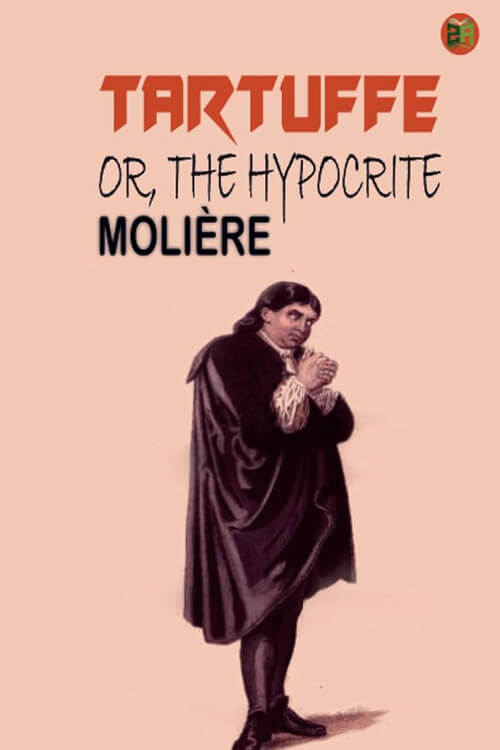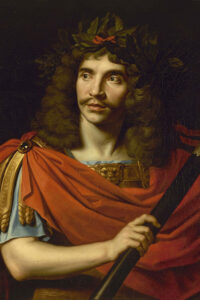
Tartuffe or, The Hypocrite
MADAME PERNELLE You’re a fool, my boy—f, o, o, l Just spells your name. Let grandma tell you that I’ve said a hundred times to my poor son, Your father, that you’d never come to good Or give him anything but plague and torment.
MARIANE I think …
MADAME PERNELLE O dearie me, his little sister! You’re all demure, butter wouldn’t melt In your mouth, one would think to look at you. Still waters, though, they say … you know the proverb; And I don’t like your doings on the sly.
ELMIRE But, mother …
MADAME PERNELLE Daughter, by your leave, your conduct In everything is altogether wrong; You ought to set a good example for ‘em; Their dear departed mother did much better. You are extravagant; and it offends me, To see you always decked out like a princess. A woman who would please her husband’s eyes Alone, wants no such wealth of fineries.
CLEANTE But, madam, after all …
MADAME PERNELLE Sir, as for you, The lady’s brother, I esteem you highly, Love and respect you. But, sir, all the same, If I were in my son’s, her husband’s, place, I’d urgently entreat you not to come Within our doors. You preach a way of living That decent people cannot tolerate. I’m rather frank with you, but that’s my way— I don’t mince matters when I mean a thing.
DAMIS Mr. Tartuffe, your friend, is mighty lucky …
MADAME PERNELLE He is a holy man, and must be heeded; I can’t endure, with any show of patience, To hear a scatterbrain like you attack him.
DAMIS What! Shall I let a bigot criticaster Come and usurp a tyrant’s power here? And shall we never dare amuse ourselves Till this fine gentleman deigns to consent?
Read or download Book
Jean Baptiste Poquelin Moliere
Jean-Baptiste Poquelin (5 January 1622 (baptized) – 17 February 1673), known by his stage name Molière, was a French playwright, actor, and poet, widely regarded as one of the great writers in the French language and world literature. His extant works include comedies, farces, tragicomedies, comédie-ballets, and more. His plays have been translated into every major living language and are performed at the Comédie-Française more often than those of any other playwright today. His influence is such that the French language is often referred to as the “language of Molière”.
Born into a prosperous family and having studied at the Collège de Clermont (now Lycée Louis-le-Grand), Molière was well suited to begin a life in the theatre. Thirteen years as an itinerant actor helped him polish his comedic abilities while he began writing, combining Commedia dell’arte elements with the more refined French comedy.
Through the patronage of aristocrats including Philippe I, Duke of Orléans—the brother of Louis XIV—Molière procured a command performance before the King at the Louvre. Performing a classic play by Pierre Corneille and a farce of his own, The Doctor in Love, Molière was granted the use of Salle du Petit-Bourbon near the Louvre, a spacious room appointed for theatrical performances. Later, he was granted the use of the theatre in the Palais-Royal. In both locations, Molière found success among Parisians with plays such as The Affected Ladies, The School for Husbands, and The School for Wives. This royal favor brought a royal pension to his troupe and the title Troupe du Roi (“The King’s Troupe”). Molière continued as the official author of court entertainments.
Despite the adulation of the court and Parisians, Molière’s satires attracted criticism from other circles. For Tartuffe’s impiety, the Catholic Church in France denounced this study of religious hypocrisy, which was followed by a ban by the Parlement, while Dom Juan was withdrawn and never restaged by Molière. His hard work in so many theatrical capacities took its toll on his health and, by 1667, he was forced to take a break from the stage. In 1673, during a production of his final play, The Imaginary Invalid, Molière, who suffered from pulmonary tuberculosis, was seized by a coughing fit and a hemorrhage while playing the hypochondriac Argan; he finished the performance but collapsed again and died a few hours later.
Life
Molière was born in Paris shortly before his christening as Jean Poquelin on 15 January 1622. Known as Jean-Baptiste, he was the first son of Jean Poquelin and Marie Cressé, who had married on 27 April 1621. His mother was the daughter of a prosperous bourgeois family. Upon seeing him for the first time, a maid exclaimed, “Le nez!”, a reference to the infant’s large nose. Molière was called “Le Nez” by his family from that time. He lost his mother when he was 10, and he does not seem to have been particularly close to his father. After his mother’s death, he lived with his father above the Pavillon des Singes on the rue Saint-Honoré, an affluent area of Paris. His education likely commenced with studies at a Parisian elementary school, followed by his enrolment in the prestigious Jesuit Collège de Clermont, where he completed his studies in a strict academic environment and got a first taste of life on the stage.
In 1631, his father Jean Poquelin purchased from the court of Louis XIII the posts of “valet de chambre ordinaire et tapissier du Roi” (“valet of the King’s chamber and keeper of carpets and upholstery”). His son assumed the same posts in 1641. The title required only three months’ work and an initial cost of 1,200 livres; the title paid 300 livres a year and provided several lucrative contracts. Molière also studied as a provincial lawyer sometime around 1642, probably in Orléans, but it is not documented that he ever qualified. So far he had followed his father’s plans, which had served him well; he had mingled with nobility at the Collège de Clermont and seemed destined for a career in office.
In June 1643, when Molière was 21, he decided to abandon his social class and pursue a career on the stage. Taking leave of his father, he joined the actress Madeleine Béjart, with whom he had crossed paths before, and founded the Illustre Théâtre with 630 livres. They were later joined by Madeleine’s brother and sister.






